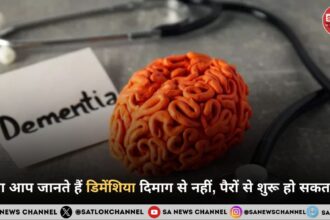India is facing a renewed rise in COVID-19 cases, with fresh infections reported across multiple states. This latest uptick is being driven by new subvariants of the Omicron strain, including KP.2 and JN.1.
- Highlights on COVID Cases
- The Return of COVID-19: What’s Different This Time?
- States Reporting the Rise
- Symptoms of Concern: What to Watch For
- Government’s Response: Alert Mode Activated
- Vaccination & Booster Strategy
- Avoid Panic, Practice Awareness
- Key safety tips:
- India’s COVID-19 Update (May 2025): Rise in Mild Cases Linked to New Omicron Subvariants
- Variant Profiles
- Government Response
- Vaccination Guidance
- Key Takeaways
- How does SatGyan help during health crises?
- 1. Mental Stability through True Spiritual Knowledge
- 2. Protection through True Worship (SatBhakti)
- 3. Disciplined Lifestyle as per Divine Rules
- 4. Satsang: The Psychological Medicine
- 5. SatGyan Reduces Hospital Dependency
- 6. Social and Financial Relief
- Real-Life Example
- Contribution of Sant Rampal Ji Maharaj During the COVID-19 Pandemic
- 1. Large-Scale Relief Campaign (Humanitarian Efforts)
- 2. Spiritual Awareness and Mental Strength
- 3. “Stay Home, Do Worship” Campaign
- 4. Ashrams Converted into Quarantine Centers
- 5. Support in Medicines and Treatments
- 6. Reaching Millions Digitally
- 7. Promotion of a Disciplined Lifestyle
- In Summary
- Conclusion
- FAQs: India’s COVID Comeback
- Q1. Are the new Omicron sub variants more dangerous?
- Q2. Should I get a booster dose now?
- Q3. Is masking mandatory again in India?
- Q4. Are schools or travel affected?
- Q5. What can I do to stay safe?
- Q6. How does SatGyan help during health crises?
- Connect With Us on the Following Social Media Platforms
Although hospitalizations remain low, the government has increased surveillance, issued advisory notes, and recommended booster vaccinations. Amid the medical updates, spiritual teachers like SatGuruDev remind us that community health and mental discipline go hand in hand.
Highlights on COVID Cases
- New Omicron subvariants KP.2 and JN.1 are circulating in several Indian states
- Daily active cases remain under control, but numbers are rising gradually.
- Symptoms remain largely mild, but precaution is urged for elderly and immunocompromised individuals.
- The government has resumed genome sequencing and issued mask advisories in hospitals.
- ICMR recommends booster doses and seasonal influenza caution.
- No full lockdown or travel restrictions currently.
- Experts advise against panic; promote hygiene, distancing, and vaccine updates.
- From a SatGyan perspective: spiritual calm and collective consciousness can help curb chaos and anxiety.
The Return of COVID-19: What’s Different This Time?
While the scale of the crisis is nowhere near the 2021 peak, the recent data suggests a slow but notable rise in COVID-19 infections, particularly in urban clusters. New subvariants, mainly KP.2 and JN.1, show higher transmissibility but similar clinical patterns — predominantly mild cold-like symptoms.
The World Health Organization (WHO) has classified JN.1 as a “variant of interest,” indicating increased monitoring, while the KP.2 strain is under review.
States Reporting the Rise
States such as Maharashtra, Kerala, Delhi, and Karnataka have seen the highest increase in cases over the past month. The Health Ministry is keeping close watch on community clusters and pushing for increased testing where needed.
Also Read: RNA: The Blueprint of Life and Its Role in Modern Science
Hospitals have been instructed to reintroduce thermal scanning and mask advisories, especially in outpatient departments and for visiting relatives.
Symptoms of Concern: What to Watch For
Doctors report symptoms are generally mild but advise caution for the elderly, pregnant women, and immunocompromised individuals.
Common symptoms include:
- Low-grade fever
- Runny nose and sore throat
- Mild headache
- Cough and body ache
- Occasional conjunctivitis
While hospital admissions have not spiked, long COVID remains a potential post-infection concern.
Government’s Response: Alert Mode Activated
1.The Union Health Ministry has:
2. Re-started random genome sequencing of positive cases
3. Issued advisories for hospital preparedness
4. Recommended voluntary masking in public transport and indoor gatherings
5. Released state-specific health bulletins
States like Tamil Nadu and Gujarat are also revisiting their isolation wards and oxygen supply plans as a preventive measure.
Vaccination & Booster Strategy
India’s vaccination rate remains high, but booster dose coverage is uneven. ICMR has advised the following:
- Elderly and those with comorbidities should take a booster dose, especially if the last one was over 9 months ago.
- Children and young adults are not yet advised to take updated boosters but must maintain hygiene and masking practices.
- Covaxin and Covishield continue to be effective, though updated mRNA options may be introduced in private settings.
Avoid Panic, Practice Awareness
Health experts are cautioning against unnecessary panic. “This is not a wave, but a ripple,” says Dr. Randeep Guleria, former AIIMS Director.
He adds that mild surges are expected every 8–12 months as the virus evolves, but existing healthcare systems are now better equipped.
Key safety tips:
- Mask up in closed spaces
- Avoid crowded indoor events
- Monitor symptoms early
- Isolate if tested positive
India’s COVID-19 Update (May 2025): Rise in Mild Cases Linked to New Omicron Subvariants
India is witnessing a modest resurgence of COVID-19 cases, primarily driven by new Omicron subvariants such as NB.1.8.1, LF.7, XFG, and JN.1. As of May 27, 2025, active cases have surpassed 1,000 nationwide, with Kerala, Maharashtra, Delhi, Gujarat, and Tamil Nadu reporting the highest numbers.
Variant Profiles
JN.1: Currently the most prevalent strain in India, JN.1 exhibits mild symptoms but has unique features that distinguish it from previous variants.
NB.1.8.1 & LF.7: These sub variants, detected in Tamil Nadu and Gujarat respectively, are classified as Variants Under Monitoring (VUMs) by the WHO. They are associated with mild, flu-like symptoms and have not shown increased severity or transmissibility compared to earlier strains.
XFG: Identified in Gujarat, XFG is another Omicron subvariant under observation, with no significant deviations in symptoms or severity reported thus far.
Government Response
The Indian government and state health departments are maintaining vigilance without inducing public panic:
- Surveillance and Testing: States like Odisha and Bihar have ramped up monitoring and testing efforts, ensuring readiness to manage potential outbreaks.
- Healthcare Preparedness: Facilities such as RIMS in Ranchi have designated COVID-19 screening areas and isolation beds, while ensuring oxygen supply and equipment readiness.
- Public Advisories: Authorities emphasize adherence to standard precautions, including mask-wearing in crowded places and maintaining hygiene, especially for vulnerable populations.
Vaccination Guidance
Current COVID-19 vaccines and boosters, updated for 2025, remain effective against these Omicron subvariants in preventing severe illness, hospitalization, and death. Health experts recommend staying up to date with vaccinations, particularly for high-risk groups .
Key Takeaways
- The recent increase in COVID-19 cases in India is attributed to new Omicron sub variants, which currently cause mild symptoms.
- Government and health authorities are proactively monitoring the situation, enhancing testing, and ensuring healthcare readiness.
- Vaccination remains a crucial tool in mitigating severe outcomes, and the public is advised to continue following standard COVID-19 precautions.
How does SatGyan help during health crises?
SatGyan, as taught by Sant Rampal Ji Maharaj, offers a unique spiritual approach to coping with health crises—physically, mentally, and spiritually. Here’s how it can be helpfully
1. Mental Stability through True Spiritual Knowledge
During a health crisis, fear and anxiety often worsen the condition. SatGyan explains the real meaning of life, the law of karma, and the temporary nature of the body, which helps devotees remain mentally calm and spiritually strong. It teaches:
- The soul is eternal; the body is temporary.
- Pain and disease are results of past karmas—but can be reduced through Naam Diksha (Initiation).
- Fear of death reduces as one gains trust in the Supreme Power (Kabir Saheb)
2. Protection through True Worship (SatBhakti)
Sant Rampal Ji Maharaj provides Naam Initiation as per the scriptures, which includes mantras that have divine power to:
- Protect devotees from untimely death.
- Provide miraculous recoveries in many cases.
- Grant peace even during the most painful health challenges.
Many real-life examples show devotees recovering from diseases like cancer, paralysis, heart ailments, etc., which they attribute to the power of True Worship.
Read in Hindi: भारत में दी कोरोना वायरस ने फिर दस्तक
3. Disciplined Lifestyle as per Divine Rules
The spiritual discipline taught by Sant Rampal Ji promotes:
- Vegetarian diet, which is lighter and improves immunity.
- No intoxication, which protects organs and boosts recovery.
- Early sleeping and waking habits, aligned with the body’s natural rhythm.
- This lifestyle significantly supports healing and general well-being.
4. Satsang: The Psychological Medicine
Regular listening to Sant Rampal Ji’s Satsang works as a mental health therapy. It:
- Distracts the mind from suffering.
- Uplifts mood and motivation to fight illness.
- Encourages positive thinking and surrender to God.
5. SatGyan Reduces Hospital Dependency
Thousands have testified that after taking Naam and following the path shown by Sant Rampal Ji:
- Frequent illnesses are reduced.
- Dependency on medicines and hospitals decreased.
- Many got cured without surgeries or expensive treatments.
6. Social and Financial Relief
During health emergencies, Sant Rampal Ji’s followers:
- Volunteer to donate blood, arrange free ambulance services, and provide support systems to fellow devotees.
- The community becomes a strong backbone during personal health tragedies.
Real-Life Example
A devotee from Haryana suffering from final-stage cancer was told she had only days to live. After taking Naam Diksha from Sant Rampal Ji and doing prescribed mantras, her condition miraculously stabilized and eventually reversed, shocking her doctors.
Contribution of Sant Rampal Ji Maharaj During the COVID-19 Pandemic
During the deadly COVID-19 pandemic, Sant Rampal Ji Maharaj made a remarkable, organized, and selfless contribution. He not only spiritually strengthened His followers but also led a massive humanitarian relief campaign for society. Here’s how:
1. Large-Scale Relief Campaign (Humanitarian Efforts)
Under the guidance of Sant Rampal Ji Maharaj, devotees across India launched organized relief efforts:
- Cooked food packets were distributed to the poor, migrant workers, and daily-wage laborers during lockdown.
- Essential ration kits (wheat, rice, pulses, oil, etc.) were provided to thousands of families.
- Free face masks and sanitizers were distributed in villages and cities.
- Blood donation camps and oxygen cylinder support helped save countless lives.
“A true saint is one who serves society during times of crisis.” — Sant Rampal Ji Maharaj
2. Spiritual Awareness and Mental Strength
As people battled fear, loneliness, and depression during COVID, Sant Rampal Ji Maharaj offered solace through spiritual wisdom:
- True spiritual knowledge (SatGyan) removed fear of death.
- Taught that the soul is eternal, and the body is temporary.
- Chanting of Naam (holy mantras) helped reduce suffering and brought mental peace.
- Millions connected through TV, YouTube, and mobile phones to listen to His discourses and found hope and courage
3. “Stay Home, Do Worship” Campaign
Sant Rampal Ji encouraged people:
- To strictly follow lockdown rules.
- Stay at home and engage in true worship (Naam Jaap), and help others while taking proper precautions.
- This message empowered people to protect their health while spiritually Progressing
4. Ashrams Converted into Quarantine Centers
In many areas, His followers offered Ashrams to local authorities to use them as COVID quarantine or isolation centers.
Police and frontline workers were also served with food and protective items.
5. Support in Medicines and Treatments
COVID patients were helped with free oxygen support, medicines, and essential medical items.
Volunteers and vehicles were provided to assist local hospitals and families in need
6. Reaching Millions Digitally
Through Sant Rampal Ji Maharaj’s official YouTube channels, Facebook Lives, and TV programs, spiritual teachings reached millions during lockdown.
Thousands took Naam Initiation online and found spiritual peace amidst the pandemic.
7. Promotion of a Disciplined Lifestyle
Teachings by Sant Rampal Ji Maharaj emphasize:
- Pure vegetarianism
- Complete abstinence from intoxication
- Early rising and remembrance of God
- Simple and regulated life Summary
- Such a lifestyle boosts immunity, calms the mind, and helps prevent diseases like COVID-19.
In Summary
Sant Rampal Ji Maharaj viewed the COVID pandemic not just as a medical crisis but as a spiritual wake-up call. He proved that a true saint:
- Provides spiritual knowledge
- Engages in humanitarian service
- Encourages devotion to God—all at the same time
SatGyan Insight:
“When the world is in crisis, God works through His true devotees.”
— Sant Rampal Ji Maharaj
Conclusion
SatGyan doesn’t reject medical science—it complements it. It provides the spiritual strength, mental peace, and divine intervention that medical tools alone cannot. In times of health crisis, it becomes a shield for the soul and a support system for the body.
FAQs: India’s COVID Comeback
Q1. Are the new Omicron sub variants more dangerous?
No, current data suggests KP.2 and JN.1 are more transmissible but not more severe in terms of symptoms.
Q2. Should I get a booster dose now?
If you are above 60, immunocompromised, or have a gap of more than 9 months since the last dose, yes.
Q3. Is masking mandatory again in India?
Not mandatory nationwide, but recommended in hospitals, crowded indoor spaces, and public transport.
Q4. Are schools or travel affected?
No closures or restrictions have been announced. However, schools are asked to monitor absenteeism and report clusters.
Q5. What can I do to stay safe?
Follow simple steps: wear a mask, wash hands regularly, avoid closed gatherings, and consult a doctor if symptoms persist.
Q6. How does SatGyan help during health crises?
SatGyan offers mental peace and practical wisdom. Meditation, spiritual reflection, and discipline help reduce anxiety and boost immune strength from within.









